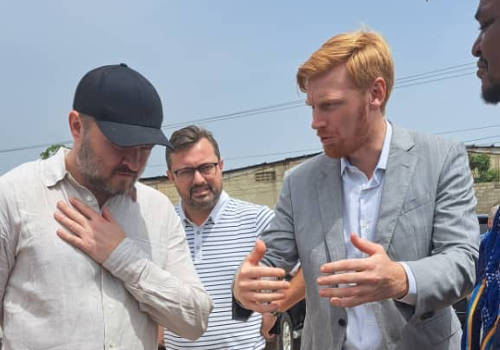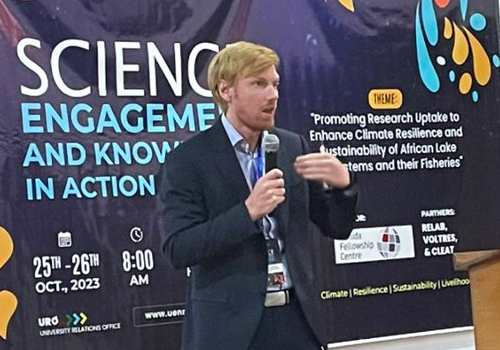
From Denmark to Ghana: Mathias creates sustainable water supply
Mathias Thuborg Madsen works at the Danish Embassy in Ghana, where he is leading a Danish-Ghanaian collaboration to improve the country’s water sector. He studied Market and Management Anthropology at SDU and has always been curious about people and the world.
Imagine you’re visiting North Tongu, a small village in Ghana, after devastating floods have washed away half of the village and forced 12,000 residents to flee. The floods have levelled the people’s clay houses and they have lost everything.
This was the sight that recently greeted Mathias Thuborg Madsen and the rest of the delegation from the Danish Embassy in Ghana when they visited the village of North Tongu.
- It’s extremely scary. What affected me the most is that in Denmark you hardly ever hear about these kinds of disasters and also meeting the people who have just lost everything. They have no insurance and nothing to return to, yet they greeted us with smiles and optimism. It puts a lot of things into perspective, says Mathias Thuborg Madsen when asked about which of the experiences made the biggest impression on him in Ghana.
Embassy’s water expert
Mathias Thuborg Madsen, who studied for his bachelor’s degree in Market and Management Anthropology at the University of Southern Denmark from 2012–2015, headed to Ghana in February to start a new job as sector counsellor for cities, water and climate at the Danish Embassy in the capital Accra.
He is the Embassy’s expert in the water sector and is responsible for a public authority collaboration between Aarhus Municipality, Aarhus Vand, the Ghanian municipality Tema Metropolitan Assembly and Ghana Water.
The goal is to improve the water and wastewater sector in Tema through long-term capacity building, and to export and share Danish experience, solutions and technology that can make the water sector in Ghana more sustainable in the long term, for instance, by mobilising data and applying concepts such as total cost of ownership.

As well as this, he also has other tasks at the Embassy, including citizen service tasks, managing budgets and preparing various documents for different stakeholders.
Initiatives make a big difference
Mathias Thuborg Madsen gives an insight into some of the initiatives in the water area:
- These are projects that can make a big difference in the local area. For example, many low-income families live in central Tema, where the sewers are in really poor condition. The sewers aren’t covered, so they’re used as rubbish bins and get clogged up. After a cloudburst, the contaminated water can cause a health crisis.
- So we’ve created maintenance programmes in which we draw on experts from Aarhus Vand, who have strengthened the organisation in Tema, and they now have the tools and resources to clean the sewers and thus divert wastewater away from the city centre. We’ve had a fair bit of success with this, but there’s still a long way to go, as we often forget that operation and maintenance cost money.
”It’s great to see that the residents' well-being is improving. They have water more often and are less ill
Another example is when burst water pipes are to be located. In Ghana, water pipes are like an underground maze, and on top of that illegal connections make it challenging to find leaks. Therefore, the focus has been on developing digital tools combined with methods for listening to the water pipes to reduce the time from breakage to locating and repairing the leaks.

Mathias Thuborg Madsen says that although resources are limited, progress is being made. And as the effects of the initiatives are documented, local organisations are geared up to receive investments so that the initiatives can be scaled to more cities or the rest of the country. In particular, when it comes to water supply, the local partner Ghana Water can see a positive impact on the bottom line, as wastewater in Tema is extremely costly because the water has previously been purified and transported 60-80 kilometres to then simply be wasted.
That was also one of the reasons Mathias Thuborg Madsen applied for the job:
- The initiative has already come a long way and the water technology is already in use in several places, so you can help move things forward and see tangible results very quickly. That’s what really attracted me to the job. It’s great to see that the residents' well-being is improving. They have water more often and are less ill.
Mathias Thuborg Madsen
Current job
- Counsellor (Cities, Water and Climate) at the Danish Embassy in Ghana
Previous jobs
- Political Advisor at the Confederation of Danish Industry (DI Water)
- Head of R&D and development consultant at Frederiksberg Municipality
Education
- BSc in Market and Management Anthropology from the University of Southern Denmark
- MA in Anthropology and Globalisation from Aarhus University
- Graduate Diploma in Business Administration from Copenhagen Business School
As did the idea of working abroad, because Mathias Thuborg Madsen has always travelled a lot, and with a background as an anthropologist, in the wake of corona the desire to travel and try something new only grew stronger.
Tools for understanding culture and the world
It was also his fascination with culture and the world that influenced his choice of study. When he travelled around Eastern Europe, the Middle East and India back in 2012, he met several anthropologists, which really opened his eyes to the field. But he was also interested in the economics and market aspects of society, which is why he chose the bachelor programme in Market and Management Anthropology (MMA) at the University of Southern Denmark Business School.
- It was interesting to combine the qualities of critical thinking and subjective understanding from anthropology with more classic management and economic tools for understanding the world. It’s a really great combination, he says and adds:
- The MMA programme is very agile, and the whole point of it is to educate students for an agile labour market. I think the educational programme actually achieves this because it has a pretty wide range, but you can also specialise in a specific area, as I did in the public utility sector, for example.
”What’s a bit special about the MMA programme is that you go out into the world and try out the anthropological tools
When Mathias Thuborg Madsen thinks back on his studies, he learned a great deal in particular from the fifth semester of the MMA programme, which is dedicated to studying and conducting field studies abroad.
He travelled to the UK to study electives focusing on climate and sustainability at Schumacher College in Devon, where he also did a field study on hitchhiking and meeting new people while travelling in this way.
- What’s a bit special about the MMA programme is that you go out into the world and try out the anthropological tools. In this respect, you have a lot of options and can choose the area you want to work in. The fact that I had to find my way academically and stand on my own two feet for six months really helped me mature.
Close relationships and trust
Returning once again to Ghana, the encounter with Ghanaian culture has made a big impression on Mathias Thuborg Madsen.
- Although the resources are limited and society is much less transparent than in Denmark, the system is all about building close relationships. And because the legal system is not as strong as in Denmark, it crucial that you trust in those you interact and collaborate with.
- The interplay between critical thinking from MMA and the urge to understand what drives people to act the way they do, has been a strength in building relationships, he concludes.
You are welcome to contact Mathias if have any questions.
Top photo: Visit of the Mayor of Aarhus to Tema as part of the signing of the MoU to engage in fase 2 of the Strategic Sector Cooperation.
Market and Management Anthropology
The MMA includes courses in anthropological theory and methodology – courses that introduce management and marketing from not only a business but also from an anthropological perspective, as well as courses in economics, accounting and finance.